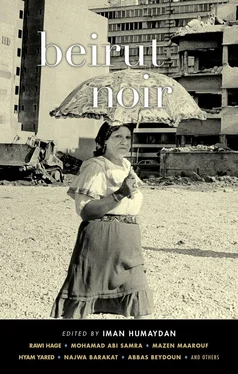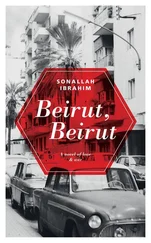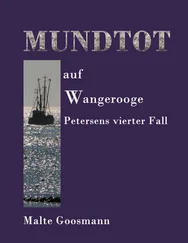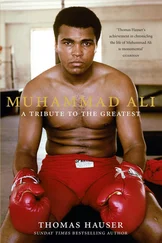Muhammad Abi Samra - Beirut Noir
Здесь есть возможность читать онлайн «Muhammad Abi Samra - Beirut Noir» весь текст электронной книги совершенно бесплатно (целиком полную версию без сокращений). В некоторых случаях можно слушать аудио, скачать через торрент в формате fb2 и присутствует краткое содержание. Город: New York, Год выпуска: 2015, ISBN: 2015, Издательство: Akashic Books, Жанр: Детектив, на английском языке. Описание произведения, (предисловие) а так же отзывы посетителей доступны на портале библиотеки ЛибКат.
- Название:Beirut Noir
- Автор:
- Издательство:Akashic Books
- Жанр:
- Год:2015
- Город:New York
- ISBN:978-1-61775-344-2
- Рейтинг книги:3 / 5. Голосов: 1
-
Избранное:Добавить в избранное
- Отзывы:
-
Ваша оценка:
- 60
- 1
- 2
- 3
- 4
- 5
Beirut Noir: краткое содержание, описание и аннотация
Предлагаем к чтению аннотацию, описание, краткое содержание или предисловие (зависит от того, что написал сам автор книги «Beirut Noir»). Если вы не нашли необходимую информацию о книге — напишите в комментариях, мы постараемся отыскать её.
Most of the writers in this volume are still living in Beirut, so this is an important contribution to Middle East literature — not the “outsider’s perspective” that often characterizes contemporary literature set in the region.
Beirut Noir — читать онлайн бесплатно полную книгу (весь текст) целиком
Ниже представлен текст книги, разбитый по страницам. Система сохранения места последней прочитанной страницы, позволяет с удобством читать онлайн бесплатно книгу «Beirut Noir», без необходимости каждый раз заново искать на чём Вы остановились. Поставьте закладку, и сможете в любой момент перейти на страницу, на которой закончили чтение.
Интервал:
Закладка:
I linger for a moment and then dive into her. There is so much life here for someone who has suffered so much. True, she is lazy; loves to sleep in and hates cooking, but she is capable of so much love. I wrap myself around her heart and squeeze... sending signals rushing through her body. I want to tell her everything will be all right, but I know it won’t. She is not going to find love again and her ankles will continue to swell. In a few years, she won’t even be able to climb these stairs anymore. I squeeze tighter and she quickly sits down on a step, thinking she’s having a heart attack. When I release, it sends her whole body shaking and she has the most incredible orgasm of her life. Right there on the steps, she hugs herself tight and screams in joy and fear. She will never experience anything like this again. And she will never be able to share this story with anyone. But she will always know how special she is and she will never give up on love. Until her ankles fail her, she will continue to walk up and down these stairs hoping for a replay of this afternoon.
I let go and fly up into the purple jacaranda tree above her, continuing my journey toward Graham Street. Beirut is most beautiful when the jacarandas are in bloom. For a moment I reflect on how these trees also exist in Havana and Islamabad, and it’s beautiful to think about how we are all connected. Humans need passports to travel, but trees only need seeds. I leave Naila straddled on the stairs, smiling and sweating profusely. Naila is Rida’s sister. It’s just the two of them left now. Souraya will soon follow me in a horrible accident. On the day that our Speaker of the House of Parliament will be assassinated, Souraya will be walking by Uncle Deek Café along the Corniche at exactly 3:15 p.m. when explosives, the equivalent of two thousand kilograms of TNT, will detonate. They will not be able to find her body, as it will completely disintegrate. They will never know that she was pregnant again. What they will find, however, is her left shoe. The one with the pink insole. In Beirut, people blow people up like it’s something casual.
I realize that I’m not ready to leave. I like it here... No, I love it. I want to stay, but I know I’m not supposed to be here now. The Great Wall has fallen and I’m supposed to be there soon. But I want to stay — in Beirut. They say that in Beirut, you live like there’s no tomorrow. Every day is so intense. So extreme. Here, people work, argue, drive, dance, drink, and even make love as if it were their last day on earth. When you’re constantly courting death, you learn how to appreciate life. You learn how to improvise dinners over candlelight because the electricity has just been cut again. You grow gardenias and jasmine to cover up bullet holes on your buildings. You become naturally creative because absolutely nothing is certain and no day is ever like the previous one.
I am halfway down Graham Street and I stop to watch the fishermen as they come into port. As they unload their small wooden boats with the night’s catch of sardines and Sultan Ibrahim red snapper, I marvel on how this tiny port survived both the civil war as well as the monstrous rebuilding process. Prostitutes, fishermen, brand-new skyscrapers, and mimosa trees have all found a way to coexist here in Ain el Mreisseh. But there are also the Druze, a secretive monotheistic religious community who believe in reincarnation. Within the Druze faith, proselytism is not allowed and the Druze only marry other Druze. No one can join, no one can leave. This tight-knit community has held strong for centuries, withstanding occupations, wars, and even tsunamis. Rida and Naila were born Druze. Their family, the Assefs, are one of the oldest families in Ain el Mreisseh, along with the Oud, Ghawi, Sleit, Raouda, Hisshi, and Deek families. They say that the Druze moved to this part of Lebanon a century ago when the pious Sitt Mreisseh lived here. They surrounded her to protect her teachings and wisdom. When she died, they built her a shrine, which still survives today. Ain el Mreisseh literally means “the water spring of Mreisseh.”
As a Muslim, Souraya was never fully accepted into Rida’s family. The Assefs were practically one step away from disowning him, but upon the news that Souraya was pregnant, his uncles became a little more lenient. What will they think now? Naila will probably have to break the news to them. I turn around and see that she’s still sitting on the steps. Her head rests on her arms, which are wound around her knees. It looks like she might be crying. The Druze claim their faith to be more than tens of thousands of years old. Recent DNA testing has found that Druze villages contain a striking range of high-frequency and high-diversity X haplogroup, a human mitochondrial DNA (mtDNA). The X haplogroup was prevalent in the genetic makeup of people living thirty thousand years ago. I want to leave this place now. Tradition is heavy here and it is because of tradition that Naila will never marry again. She will never meet her Druze prince and she will never have the strength to do what her brother did. I wonder if my death will be blamed on Souraya and Rida’s unblessed union. I want to leave now. I really do.
I soar toward the east side of Ain el Mreisseh, to the hotels, bars, and bordellos. Just below the hotels is the infamous Zeitouni Street, now renamed Phoenicia Street, lined with nightclubs. Le Royale, Rock Inn, and Club 70 were all hot spots back in the sixties and seventies, but during the civil war they deteriorated into whorehouses. In Lebanon, prostitution is technically illegal, so pimps have come up with many creative ideas to profit from sex workers. The way it happens is by tricking the system: The prostitutes, mainly from Syria and Eastern Europe, enter the country with entertainment visas. They come in as “artists” or “dancers.” They dance in “super nightclubs” like the Excellence here on this street, or the Excalibur or Cobra in Mameltain, just outside Beirut. Once inside, you buy yourself a bottle of whiskey or champagne that will cost around a hundred dollars. A girl will approach you and if you like her, you buy her a bottle too, another hundred dollars. You can spend the whole night talking with her and if she really likes you, she may allow you to kiss her and fool around a little. By five a.m. you have to exit the club. If the girl agrees to see you again, you can pick her up the next day around one p.m. and can spend the entire day with her in your apartment or a hotel. Since you don’t go home with them the same night, the practice of “prostitution” is averted. Instead, because technically it’s the next day, you’re actually on a date. A paid date for around another hundred dollars.
I am in the East now, and I already feel lighter when a thought comes to mind: I want to find Club 70, where Rida and Souraya first met in the nineties during a brief period of postwar euphoria. I pause just before the Holiday Inn and a shiver passes through my body. So many people died here. I run my fingers across the facade of the twenty-second floor. There are still bloodstains inside this void of a structure. There is still graffiti on the walls, militia insignias and slogans. I smell burned flesh. I see bullet casings. Broken glass strewn across the floor. Stains. Excrement. Hair. I look down below and people are walking and driving, oblivious to the mess up here. It is strange to think that every day we look up at these buildings but never realize what remains inside. They are sleeping giants, and beasts lay stagnant in their bellies. I want to go down now. I see Phoenicia Street below. There it is, Club 70, just opposite Wash Me Car Wash. I perch on top of a small replica of a Fiat 500 that hangs just above the car wash entrance. Today Club 70 only attracts men, especially tourists, looking to get laid. But in the seventies, it was the “it” place. It wasn’t as big as Cave de Roi or Le Grenier next door, where celebrities like Brigitte Bardot came from all around the world to party. Club 70 attracted a younger crowd who were discovering disco, bell-bottoms, hair spray, and polyester. During the civil war, Ain el Mreisseh became the dividing point between East and West Beirut and it was here that militias and prostitutes set up shop and began to thrive. After the civil war, Club 70 temporarily shut down, then reopened in the midnineties, hoping to bring back their golden era. It lasted a few years before falling back into old habits. It was during this short revival that Rida and Souraya met.
Читать дальшеИнтервал:
Закладка:
Похожие книги на «Beirut Noir»
Представляем Вашему вниманию похожие книги на «Beirut Noir» списком для выбора. Мы отобрали схожую по названию и смыслу литературу в надежде предоставить читателям больше вариантов отыскать новые, интересные, ещё непрочитанные произведения.
Обсуждение, отзывы о книге «Beirut Noir» и просто собственные мнения читателей. Оставьте ваши комментарии, напишите, что Вы думаете о произведении, его смысле или главных героях. Укажите что конкретно понравилось, а что нет, и почему Вы так считаете.












